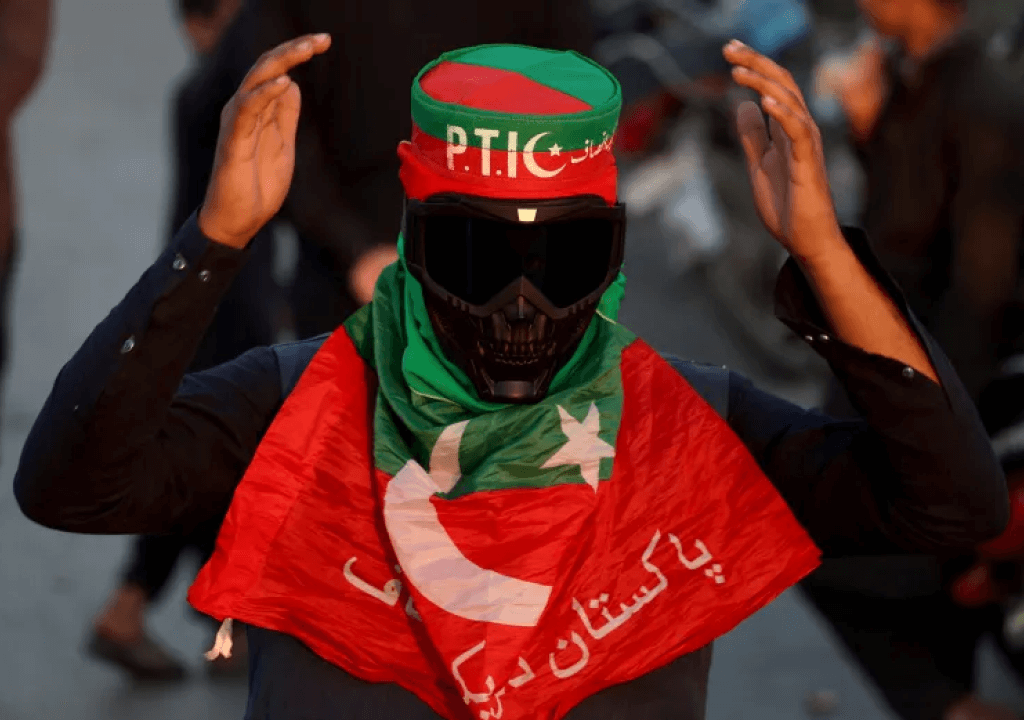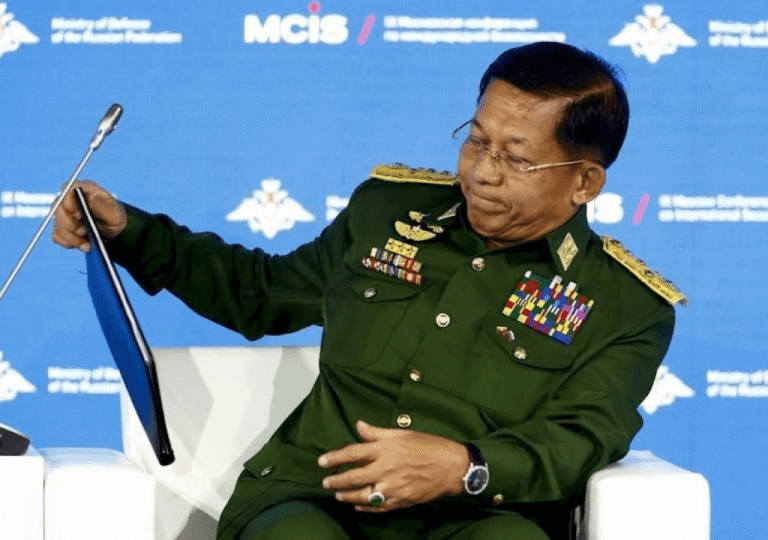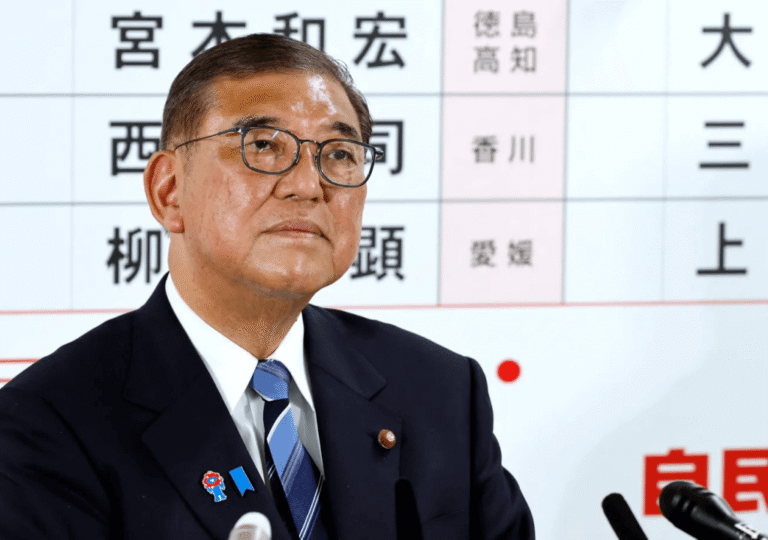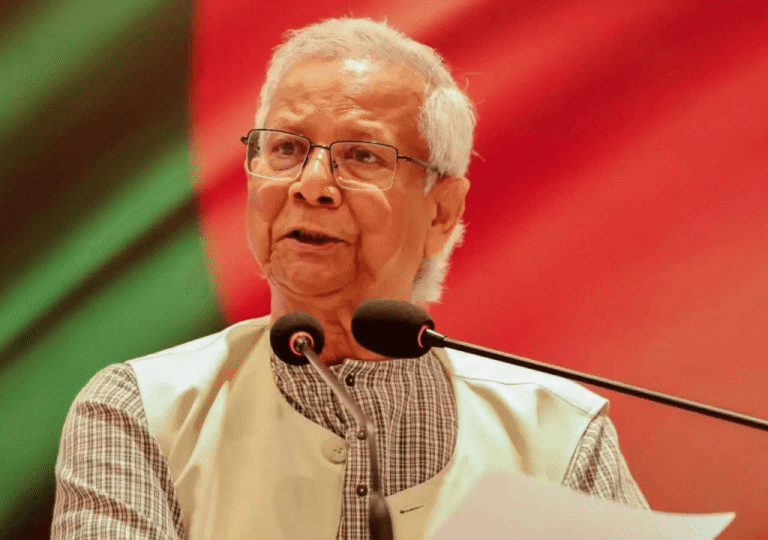In the recent Pakistan general election, both the military and Nawaz Sharif fell short in their endeavors to secure victory. Instead, the electorate opted for the alternative led by the Islamic populist figure Imran Khan, who is presently incarcerated on serious charges, including an alleged non-Islamic manner of marrying his wife – a crime in the Islamic Republic of Pakistan. Despite Imran Khan’s imprisonment, his party had to navigate the electoral landscape with independent candidates, lacking a uniform election symbol. Surprisingly, the voters rejected candidates endorsed by the military, opting instead for those aligned with Imran Khan.
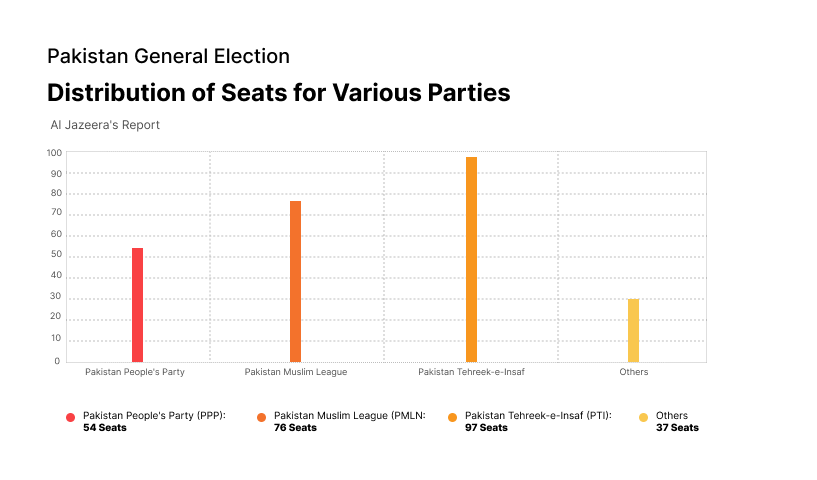
To summarize the distribution of seats for various parties in the Pakistan general election according to Al Jazeera’s report:
The total number of seats mentioned in the report is 264.
According to reports from Pakistan, no single party secured a majority in the 265-seat assembly. Imran Khan’s affiliates emerged with a leading position, securing 97 seats, although they currently lack an official party structure. The party with the majority, officially backed by the military and representing former Prime Minister Nawaz Sharif’s Pakistan Muslim League (Nawaz), is set to shape the political landscape. The election outcome underscores a significant divergence from the expectations set by the military and Nawaz Sharif, highlighting the enduring support for Imran Khan and his political vision even in the face of challenges and legal controversies.
This election outcome not only stands as a testament to Imran Khan’s political standing but, perhaps more significantly, reflects the public’s aversion to military intervention in governance. The lingering uncertainty revolves around whether Imran Khan can establish a government, fostering the potential for a coalition government or, conversely, grappling with a military junta in the upcoming term. Despite enduring challenges such as living costs, security, energy, employment, and environmental concerns, the noteworthy aspect extends beyond the yet undetermined final seat tally for each party. The remarkable voter turnout signals a resolute commitment to exercising democratic rights and resisting military interference in the electoral process.
Despite allegations of vote-rigging and a suspicious internet blackout during the election, General Asim Munir, the current army chief, remains optimistic about the outcome. The military’s endeavors to manipulate the election were seemingly thwarted, partly due to the innovative use of social media by the PTI, including AI-generated campaign videos featuring Khan addressing voters from jail.
Although Nawaz Sharif secured the second position, he assertively claims his right to form the next government. To achieve this, he may seek support from the PPP, his historical rivals, and potentially court independents aligned with Khan. Both parties, emblematic of powerful political dynasties—the Sharif family and the Bhutto family—may engage in political negotiations in the days ahead before the largest party or coalition is decided and subsequently invited by the president to form the government.
Before the polling on February 8th, the prevailing perspective suggested that Nawaz Sharif, the former prime minister and leader of the PML-N, was on the verge of assuming the role of the next prime minister. This perception gained traction as he appeared to have tacit support from Pakistan’s influential military establishment, a historical powerhouse recognized as the nation’s political arbiter, renowned for influencing elections and directly shaping governance through coups.
As the election approached, it became clear that the military leadership was resolute in preventing Imran Khan’s party from regaining power. Khan, who had initially secured victory in 2018 with military backing, experienced the dissolution of their alliance, ultimately leading to the orchestrated downfall facilitated by the generals.
In a spokesman role for Imran Khan, Ali Khan emphasized the crucial part that the military, frequently referred to as the “establishment,” plays in shaping the political environment. Ali Khan was shocked by the public’s overwhelming support and encouraged the “prime institution”, which is the military, to respect the people’s will and avoid getting directly involved in politics, even in the face of the military’s best efforts to retain control.
Despite these appeals, the imprint of the military’s influence remained unmistakable in the election outcomes. Nawaz Sharif’s apparent return from political exile, facilitated by a clandestine agreement with the army, echoed a history fraught with turbulence, marked by the conclusion of previous terms following challenges to military authority.
Within Sharif’s party, apprehensions surfaced concerning the election results and the anticipated formation of a feeble coalition government. Some speculated that this coalition might align with the military’s agenda, strategically sidestepping challenges to their political and business interests. There were murmurs of the potential ascension of Sharif’s younger brother, Shehbaz Sharif, to the role of prime minister should such a coalition come to fruition.
A senior PML-N leader intimated that the military harbored concerns about Nawaz Sharif’s pursuit of a parliamentary majority, apprehending the resurgence of a defiant leader. The military seemingly derived satisfaction from the election results, capitalizing on a society divided and polarized. A hung parliament, according to observers, conforms to the military’s proclivity for control through repression, ensuring their unopposed dominance in the political arena.
The Chief of Pakistan’s military is urging political leaders to demonstrate “maturity and unity” in the aftermath of an inconclusive recent election. The failure to produce a clear winner has prompted the military’s favored party to forge a coalition for governance. The military’s historical influence over Pakistan’s political landscape, with generals overseeing nearly half of the country’s post-1947 history since partition from India, is significant. General Syed Asim Munir stressed that elections are not a zero-sum competition but a mechanism to determine the people’s mandate. He called on political parties to respond with maturity and unity, emphasizing the importance of stability and a healing approach to transcend the prevailing politics of anarchy and polarization.
In the aftermath of an unforeseen election triumph, Imran Khan’s political party asserts its determination to lead the next government, despite opposition efforts to wrest power through a discreet coalition deal. However, challenges loom large as Khan remains incarcerated and effectively in exile, posing potential ramifications for the governance of any forthcoming administration. The political landscape, shaped by Imran Khan’s brand of Islamist populism, prompts reflections on Pakistan’s future, especially in the context of perceived shortcomings.
The election results suggest potential geopolitical repercussions as well. A fragile government backed by the military may resort to conflict with India to garner public support, a move that could exacerbate the country’s existing challenges. The unfolding political developments will likely have a profound impact on the entire region. In such a scenario, Sharif emerges as a favorable candidate for the military. The impending struggle to secure a government position may witness independent affiliates aligning with Nawaz Sharif’s coalition, enticed by financial and power incentives. Should these efforts prove unsuccessful, the imminent specter of military rule—a familiar occurrence in Pakistan—continues to loom on the horizon.

